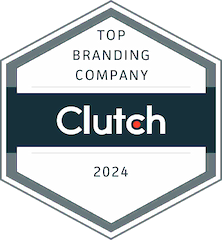
This is the second post in a five-part series designed to help organizations navigate the journey of finding their ideal branding partner.
You’ve decided to hire a branding partner, you’ve assembled a list of agencies to include in your search, and now it’s time to write a brief or Request for Proposal (RFP) to outline your project requirements. Not all search processes involve an RFP, but issuing one could be helpful for a few reasons:
- An RFP will make comparing proposals easier since all agencies are working from the same foundation
- An RFP will help with internal buy-in so your organization is aligned on the goals of the project and what you’re looking for in a partner
When someone starts a search for the first time, we often get asked what information should be included in an RFP. We find the below topics are helpful to incorporate:
Tell us about your organization
Include the basics. What do you do and why do you do it? Who are your target audiences, key stakeholders and competitors? What makes you special? If you have corporate presentations or materials you are willing to share, we appreciate reviewing these early on to understand how you present your organization to the market.
What are your business challenges
Business and brand are inextricably linked. Your brand should align with, support and reflect your business strategy, while leaving room for growth. What is your current position in the market? What are your growth plans? How do you plan to shape the future of your industry? Are there recent changes in your business, such as expanded service or product offerings or M&A activity? Are you eyeing an IPO or sale? Do you need to attract and retain talent? Have your sales slipped because competitors are encroaching on your territory? Helping us understand what is happening in the business will allow us to build a brand that will make your business successful.
What are your branding challenges
What motivated you to start looking for a branding partner? What are your objectives for the branding work and what are you hoping it will solve? For example, is your brand not reflective of your current business strategy and capabilities? Are your customers confused by how your portfolio is organized? Is your brand expression dated? Do you want to improve and measure brand awareness and reputation? Is your brand being brought to life consistently across touch points? Are employees confused about how to live the brand?
Outline your scope of work and project requirements
It’s helpful to be clear about the deliverables you hope to get from the engagement so you can easily compare proposals from multiple agencies. But also keep in mind being too
prescriptive can hinder an agency’s response. For example, instead of dictating the exact number of stakeholder interviews you want conducted, it would be more helpful to describe the decision-makers, types of stakeholders and customers that should be included in the interview process. It’s also useful to let us know if there is existing research, guidelines or documents that will inform the project. We don’t want to duplicate any of your efforts and can meet you where you are.
What qualifications are you looking for in a partner
Think about how you will evaluate and compare agencies. What are the criteria and characteristics that are important for your ideal partner to have? For example, do they need to be experts in your industry, or are you looking for a partner who can bring a fresh perspective? Is expertise in a specific capability or service offering, agency location or size important? Are there cultural aspects and values you want to align with, such as collaboration or curiosity?
Include timing and budget parameters
It’s always helpful to outline any timing and budget considerations (even if it’s a broad range) so both you and potential partners can determine early on if expectations are aligned. We consider timing and budget constraints when building our approach, as there are several solutions we can recommend to ensure we make the most of the available resources. Knowing this information upfront will allow us to find a solution for you more efficiently.
Establish the process for agency review
You don’t necessarily need to assign strict dates and have all the details figured out, but it is helpful for agencies to know a rough timeline and process for how you plan to choose your partner. For example, will you conduct pitch meetings after you receive proposals? If so, do you want to meet in person or virtually? When do you plan to kick off the engagement? Are there deadlines or milestones for the project work, and if so, what is driving these? Knowing high-level timing will help agencies allocate resources internally and assemble the best team to tackle your challenges.
Make time for an introductory Q&A call
Even the most well-written RFPs lead to additional questions. It’s also nice to meet who we could potentially be working with for several months or years and make sure there is a cultural fit on both sides. More on that in the next post.
